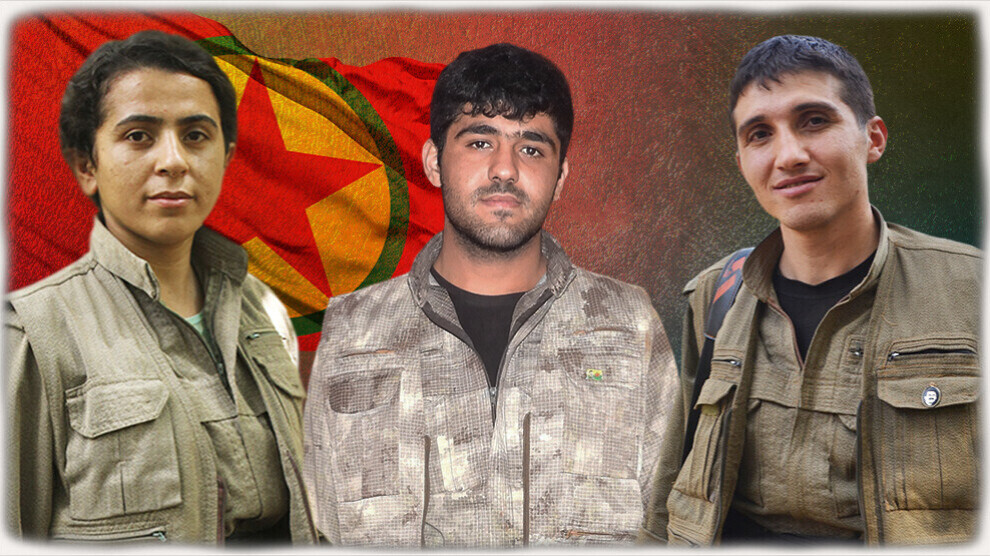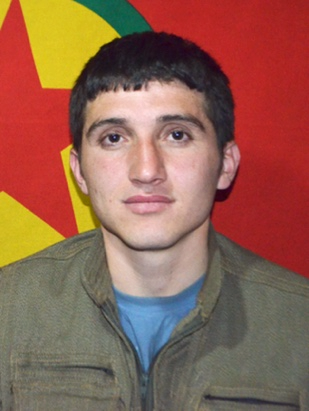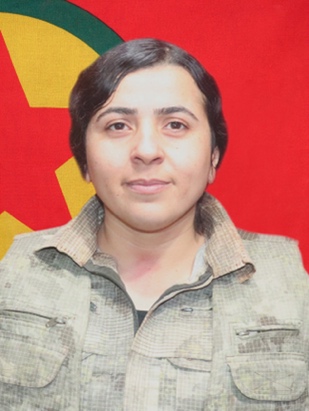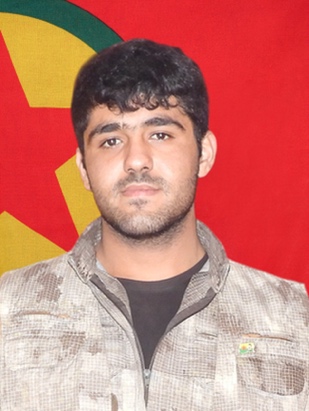HPG pays tribute to three guerrillas who fell in Zap
The HPG published the names of three fallen guerrillas. Mahir Alîşêr Koçgirî, Edessa Mûnzûr and Mazlum Dijwar died while resisting the Turkish occupation attacks in the region of Zap.
The HPG published the names of three fallen guerrillas. Mahir Alîşêr Koçgirî, Edessa Mûnzûr and Mazlum Dijwar died while resisting the Turkish occupation attacks in the region of Zap.

Guerrillas Mahir Alişêr Koçgirî, Edessa Mûnzûr and Mazlum Dijwar died in an attack carried out by the Turkish army in the region of Zap in South Kurdistan in September. The press center of the People's Defense Forces (HPG) paid tribute to the fallen guerrillas, saying they were brave militants who resisted the occupying forces of the Turkish state with great selflessness. The HPG expressed its condolences to the relatives and the people of Kurdistan.
 Codename: Mahir Alişêr Koçgirî
Codename: Mahir Alişêr Koçgirî
First and last name: Onur Kapar
Place of birth: Istanbul
Names of mother and father: Senem – Metin
Date and place of death: 29 September 2023 / Zap
 Codename: Edessa Mûnzûr
Codename: Edessa Mûnzûr
First and last name: Canda Şêxmûs
Place of birth: Amûdê
Names of mother and father: Edla – Abdulkadir
Date and place of death: 23 September 2023 / Zap
 Codename: Mazlum Dijwar
Codename: Mazlum Dijwar
First and last name: Bekir Mihemed Hesen
Place of birth: Afrin
Names of mother and father: Mûne – Mihemed
Date and place of death: 29 September 2023 / Zap
Mahir Alişêr Koçgirî
Mahir Alişêr Koçgirî was born in Istanbul. His Alevi-Turkish family originally came from Sivas (Sêwas). He grew up with the Alevi culture in a socialist-revolutionary environment and got to know PKK cadres in 2004/2005 who made a great impression on him with their modesty and love for life.
He studied Abdullah Öcalan's ideas on socialism, the revolution, a free life and a socialist personality and became politically active. In 2007, he took part in a memorial service for 17 MKP members who died in Dersim. In the same year, he was arrested for his political work and spent the following five years in prison. Shortly after his release, he went to Kurdistan in 2012 and joined the PKK guerrillas. He used his time in prison as a revolutionary academy; in the mountains he combined his theoretical knowledge with the reality of his new life. He was enthusiastic and strong-willed and dealt with problems that arose in a constructive and solution-oriented manner. Within a short time, he also developed further in the military field and benefited from experienced commanders. Due to his stable and sincere personality, he soon took on important tasks in various areas. Most recently he fought in the Shehid Delil section of the western Zap region and, with great courage and determination, took part in many successful actions against the Turkish occupying forces.”
Edessa Mûnzûr
Edessa Mûnzûr was born in Amûdê in Rojava. Her family was close to the Kurdish freedom movement and Edessa grew up in a village where the Kurdish culture and language were present. She was already aware of the PKK as a child because her family was involved in revolutionary work in Rojava from the very beginning and cadres constantly visited her parents' house. Her uncle Dijwar Zagros (Abdulselam Şêxmûs) died in combat in 1998.
In the wake of the Rojava Revolution, she also saw herself as responsible for her people. During the ISIS attack on Rojava, she saw that thousands of people from all over the country came to the country and took part in its defense. In 2015 she made a decision and went to the mountains to become a guerrilla.
As she herself said, she saw every new insight as a step towards freedom. She compared life in the PKK with her previous life in society and recognized the value that women have in the liberation struggle. Since massive attacks on the Kurdish people and the freedom movement took place during this time, she also concentrated on her military training from the start. After gaining initial skills, she fought against ISIS in the areas of Maxmur, Kerkuk and Shengal and took revenge for the Yazidi women enslaved by the Islamists. In this fight she gained important experience. She then returned to the Medya Defense Areas and stayed in Heftanin for a while. After the start of the Turkish invasion, she came to Zap and took part in the tunnel war. For them, every successful action against the enemy was a blow to the reactionary mentality of the attackers. The HPG said Edessa Mûnzûr was an exemplary militant of the PKK and PAJK.
Mazlum Dijwar
Mazlum Dijwar was born in Afrin and grew up in a Kurdish family with great love for his own country and ethical values. At the time of the Rojava Revolution, he was in the first years of his youth and was therefore part of the first generation to grow up with the principles of a new life and to internalize these principles.
He learned early on that a revolution doesn't just happen and that a high price has to be paid for it. There were also victims in his family. In 2017 he joined the freedom fighters in Rojava, and in 2018 he took part in the resistance against the Turkish invasion of Afrin with great courage and willingness to sacrifice. He then went to the mountains and became a guerrilla.
During his training he learned the basic principles of guerrilla warfare and the use of various weapons. At the same time, he dealt intensively with the ideological content of the PKK and Abdullah Öcalan's paradigm based on women's liberation, grassroots democracy and social ecology. The Turkish army's brutal attacks on the guerrillas and especially the use of chemical weapons, which led to the deaths of many fighters, strengthened his resolve and his desire for revenge. He went to the western Zap region and took part in many powerful actions against the enemy in tunnel warfare and in the field.